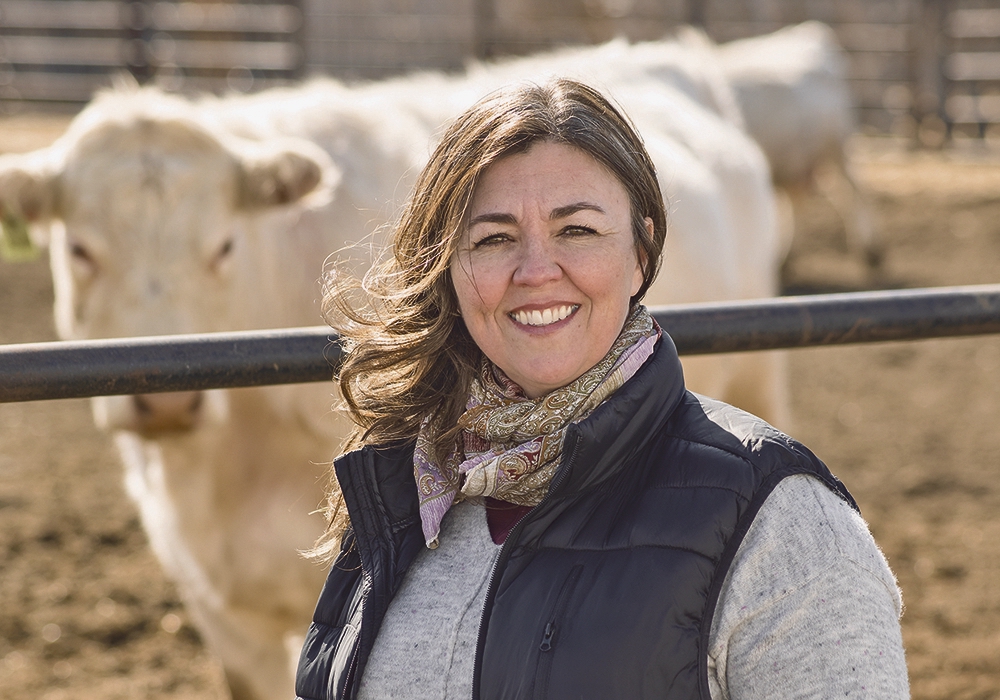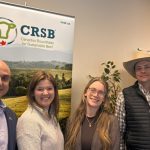So many integral parts of running a farm business can cause stress.
Finances, family disagreements, weather, long hours, lack of sleep, volatile markets, industry regulations and paperwork, uncertain crop yield, machinery breakdowns, technology, and the well-being of livestock are the most common.
High stress levels are common on farms, but that’s dangerous because they can affect the decisions you make.
Read Also

How scientists are using DNA and climate data to breed crops of the future
A method for forecasting how crops will perform in different environments so that plant breeders can quickly select the best parents for new, climate-resilient varieties.
Producer mental health
Last June, at the Saskatchewan Stock Growers Association annual general meeting in Swift Current, Sask., Cynthia Beck, producer and registered psychologist, emphasized the importance of mental health in the agricultural industry.
“I think that the number one thing for people to realize is that mental health and well-being are major drivers behind decision-making and risk-taking,” Beck says.
According to a 2021 survey by the University of Guelph, thoughts of suicide are two times higher in farmers than in the general public, and one in four producers had thought about taking their own life in the previous 12 months. Seventy-six per cent of farmers reported experiencing relatively high levels of stress.
Research at the University of Manitoba shows that while it is clear how weather and environmental challenges affect producer and animal health, the producer’s mental health can affect their livestock, too.

Katie Songer, communications campaign manager of AgKnow, a not-for-profit organization that works to destigmatize mental health and provides resources and support to farmers, says farming is one of the most stressful occupations.
“The unique challenges associated with farming can lead to an increased risk of poor mental health,” Songer writes in an email interview.
In addition to stressors, producers can experience barriers accessing mental health resources, because they live in remote rural communities where there isn’t adequate access to services. Sometimes available counsellors aren’t educated about the unique challenges of the agriculture industry. Songer says there is also concern about how disclosing mental health issues might affect the farmer’s business relationship with lenders.
“The stigma surrounding mental illness means many farmers choose to leave their symptoms unaddressed.”
Stress and decision-making
“There are physical impacts of stress on us,” Beck says. “And when you’re dealing with a lack of sleep, dehydration, nutrition, substance abuse and environmental exposures, those all add up over time.”
Songer says moderate stress can be healthy, as it makes you more alert and perform better, but only if it is brief.
“Unfortunately, if we stay in that overstressed zone for too long (chronic stress), our work is going to suffer.”
She says stress can affect a producer’s work performance by limiting how they make novel decisions and adapt to change. This can lead to poor decision-making in high-stress scenarios, which has lasting repercussions.
“The brain resorts to habitual decision-making because it exerts fewer demands on our cognitive resources,” Songer says. “Just as stress affects our ability to make new decisions, it also affects brain chemistry, making it difficult to assess benefits and costs.”
Beck highlights a situation shared with her. A cattle producer sold his entire herd essentially overnight without alerting his spouse, erasing decades of hard work and genetics. Beck says the producer told his wife there was no pasture or feed for the cattle and 24 hours later cattle liners started pulling into the yard.
“And for him — who was not sleeping, not eating, he was very stressed out — the problem was so big, but there was no way to look around it to find a solution other than the most obvious one, which was loading everything on the liner and saying goodbye.”
Beck says that was a short-term decision made because of chronic stress, which affected not only the producer but everyone around him.
“There was a lot of fallout, long-term detriments that came from that really snap decision… and that speaks to the increase in risk-taking behaviour.”
She says situations like this happen because chronic stress hinders your communication skills and decreases your ability to regulate your emotions.
Songer says poor decisions caused by stress might not just affect your operation, they could cost you your life.
“When a farmer is stressed, they may become distracted, and this distraction can cause errors that lead to serious or fatal incidents, such as tractor rollovers or entanglement in a fast-moving machine.”
Solutions
There are things you can do to mitigate your amount of stress.
According to Beck, this includes basic self-maintenance such as fueling your body, getting adequate rest (i.e., sleep and disconnecting from your workload), moving your body and adding positive activities separate from work.
She says research links long-term sleep deprivation to increased rates of diseases such as cancer and Alzheimer’s — important for producers to know, since they are usually putting in long hours and starting early in the morning.
She says taking time for yourself is very important.
“Go take a walk through your pasture. You might consider that work because you could be checking cows. But you may also find that being out there can reconnect you to your purpose, to what you’re doing there in the first place.”
Beck says when trying to combat stress, it’s important to recognize the time frame. What must get done today? Is there anything on my list that is not my responsibility or my business? When will my stress expire?
“Our stress is cyclical. We have one haying season, one silage season. But quite often, our stress is stacked on top of each other. So, what ends up happening is that we almost feel like we’re drowning all the time.
“If you break down the stress, and kind of look at what you’re dealing with in the moment and when that stress will automatically expire, it will help you to maintain your motivation level. It will also help you to maintain your productivity.”
While the farm never stops or slows down, taking the time to look after your mental health is just as important.
“Taking care of your mental health is crucial for your farm to be sustainable, profitable and personally rewarding,” Songer says. “It is not a sign of weakness to acknowledge when you are going through a stressful time. Many tools and professionals are available to help you manage the impacts of stress on your well-being and your operation, including mental health professionals.”
Beck says patience with yourself is also important when you are working to break the cycle of stress because it takes time to change habits and coping patterns.
Where to turn for help
AgKnow has identified many counsellors who are equipped to help with the specific needs of Alberta farmers as counsellors either grew up on a farm, are farmers or have previous experience with farmers. Currently, AgKnow’s farm therapy pilot program is paused, but they hope to start again once funding resumes. This doesn’t mean producers can’t book with therapists, but they will have to pay for their sessions instead of AgKnow providing those funds.
The AgKnow therapist network provides preventative support for farmers and is not intended to provide immediate crisis response, but some of their therapists are also counsellors for crisis support programs.
Resources nation-wide for farmers who need immediate assistance include 911; 988 (Suicide Crisis Canada 24-hour crisis line); or 811 (link to non-emergency health services in all provinces).
Counselling Alberta can provide low-cost counselling with no waiting list and can redirect serious cases to a crisis line.
In Saskatchewan, there is the Farm Stress Line and SaskAg Matters Mental Health Network.
Manitoba has the Farmers HelpLine through Manitoba Farmer Wellness Program and the Manitoba Farm, Rural and Northern Support Services.
Ontario has Agriculture Wellness Ontario, which has many different resources, such as the Farmer Wellness Initiative, a free individual counselling service; the Guardian Network, a volunteer suicide-prevention network; and In the Know, a mental health literacy workshop for the agriculture community.
Additional resources can be found on the Do More Ag website.
“When you feel like quitting, please remember why you started,” says Cynthia Beck, producer and registered psychologist. “Sometimes when we are really super-stressed, it’s hard to recognize why we started (in the agriculture industry). And sometimes that will bring us back into realizing why we want to keep on going.”
















